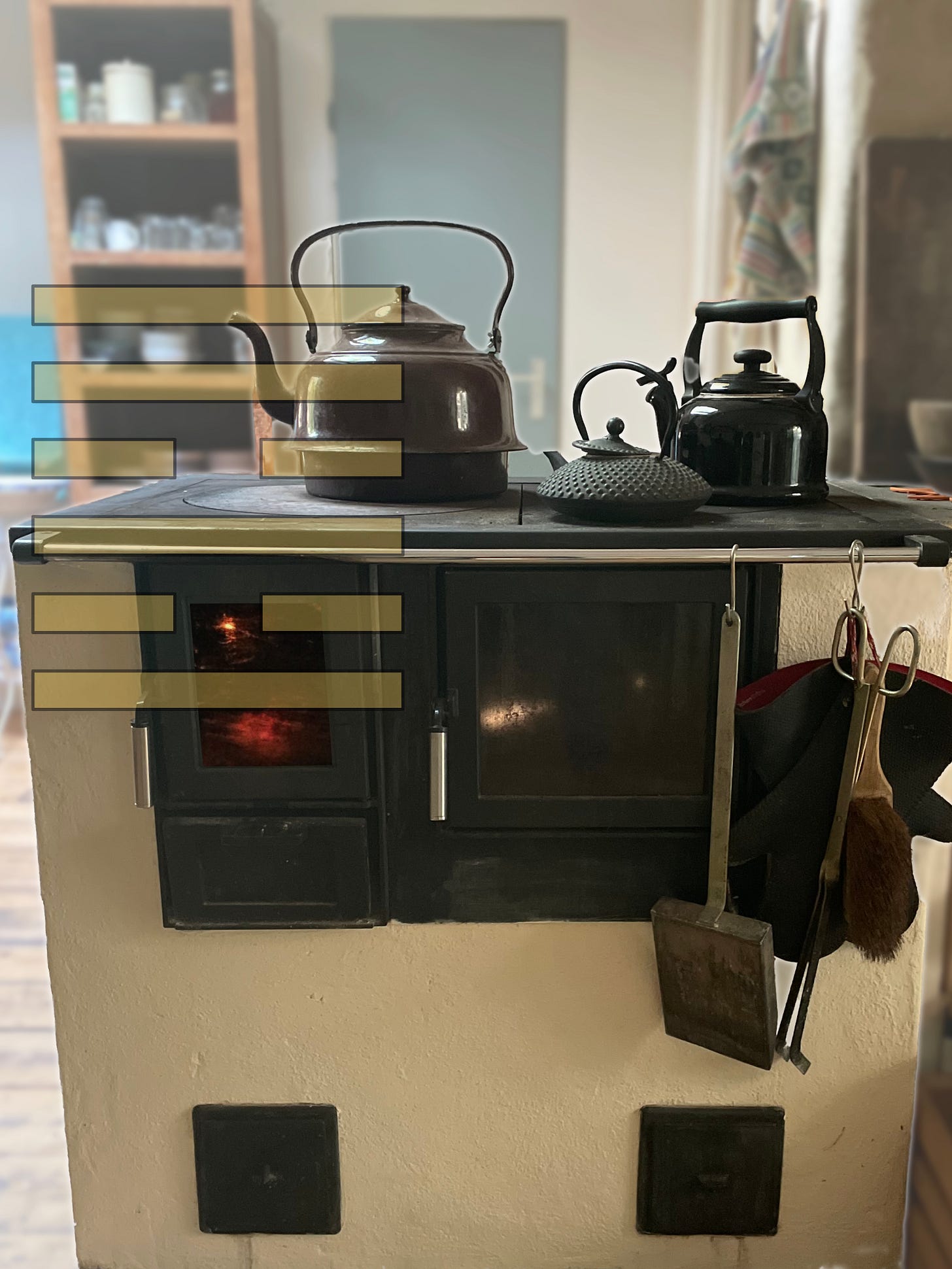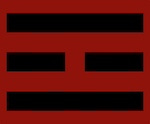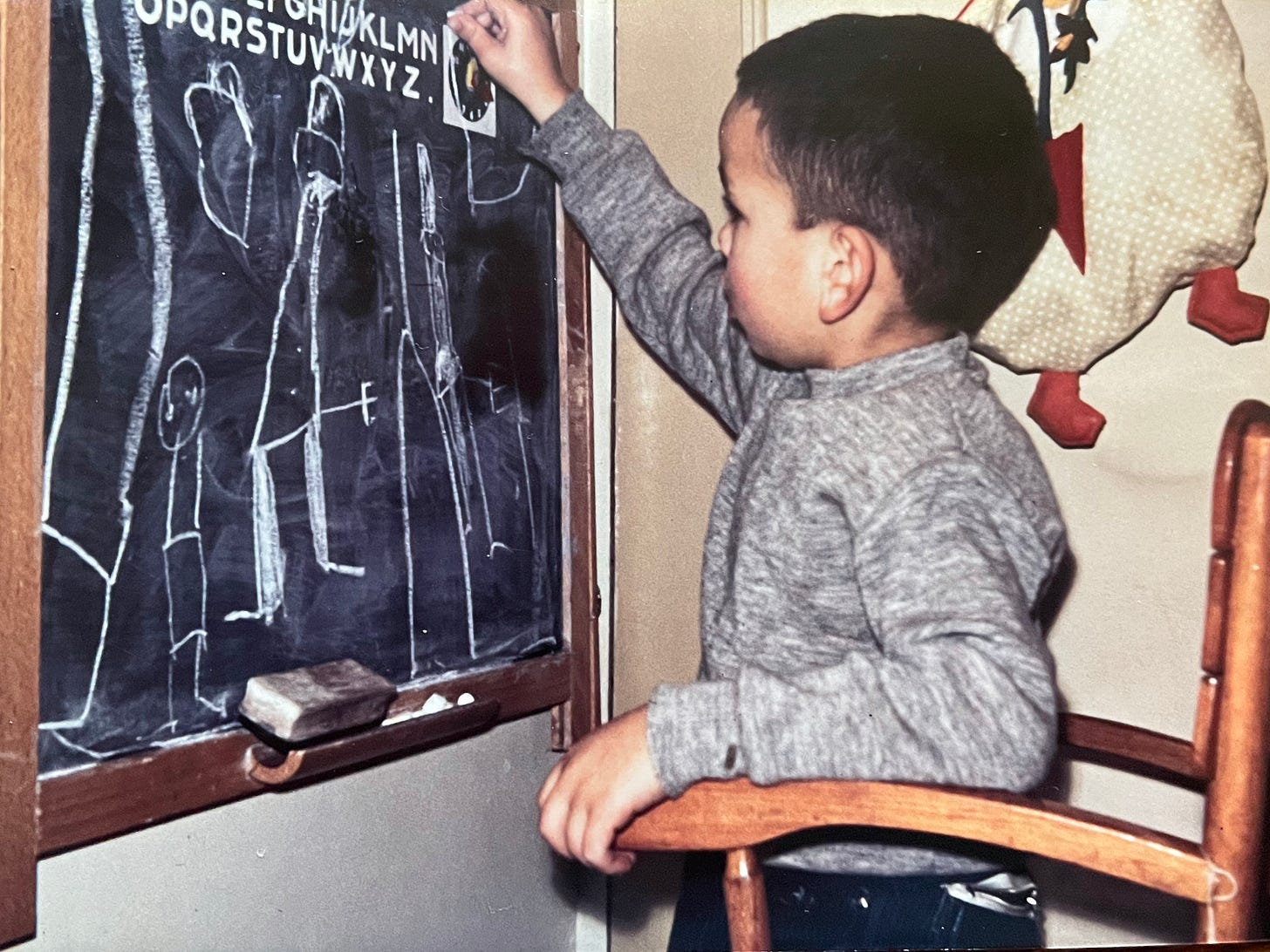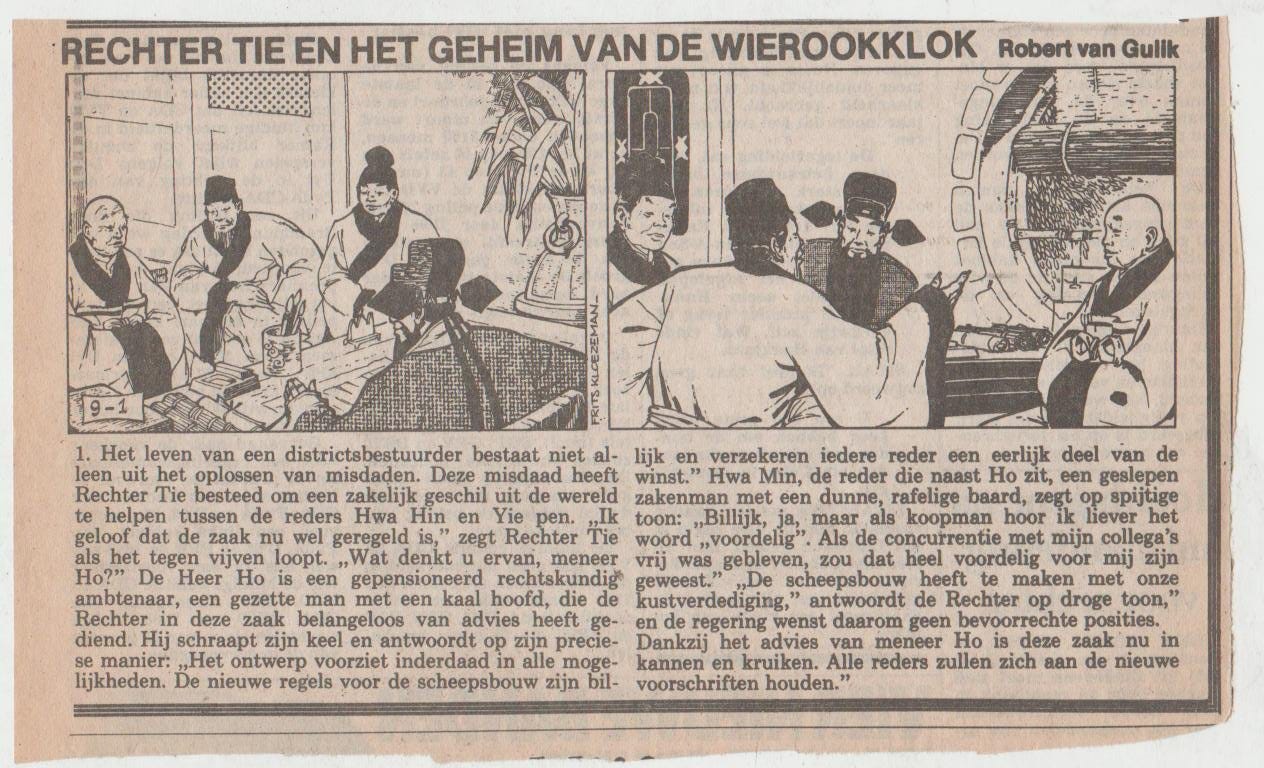
This post has been translated from Dutch into English with DeepL. It will be manually edited and streamlined soon.
THE IMAGE of the two trigrams: Fire below, Wood above. A pile of firewood, a fire, a burning stove. Learning to use fire would proved to be crucial for our distant ancestors. Wild animals stayed at a safe distance at night, food became much easier to digest, bodies could warm themselves, and around a fire was the place for telling stories. Stories connect. The warm cooker as the hub of the household. What is be better than meeting around the warm hearth? Wood over Fire: the image of the familiar, of a close-knit group of people, a clan, a family.
The kitchen, with stove to cook on and warm your hands and back, had always been the centre of domestic life. A cosy singing kettle, tea and biscuits on returning home from school. Those who thought this would always remain so counted outside the advent of the microwave, electric kettle and prefab food.
If the Family hexagram is inverted, its opposite and complement emerges: chapter 38. Estrangement. The known and the unknown stand back to back against each other. In the distance, the longing for home gnaws, but once back home, his inner turmoil forces the sailor to set sail again soon.
THE IMAGE of the two trigrams: Fire above, the Lake below. Fire and heat always move upwards. Water always seeks the lowest place. The two trigrams move apart, there is no meeting. Fire over Lake: the image of diversity and estrangement.
The sailors of yore lived on pickled meat and dry rusks. Today's space traveller drinks space food from pouches and eats BLT-sandwiches in pill form. This fills the stomach, but the alienated food makes him dream of warm apple pie, just out of the oven. You'd say: flour and some salt, water, dried apples and sultanas and, of course, cinnamon, take it all on board, and bake a cake in a spare hour. But that turned out not to be so easy. In space, the ingredients float out of the mixing bowl, there is not enough oxygen on board for a fire, too little buffer in the batteries for electric heat, and disconnected from the earth, the heat for baking does not want to rise. Bright minds spent years trying to overcome all these difficulties, and they succeeded. Cookies can finally be baked in space!

When scientists investigated the potential psychological effects of long-term missions and deep-space travel, they found things would be more bearable if astronauts have access to a good variety of foods that smell and taste a little bit more like home. The act of cooking itself also helps, according to former NASA astronaut Mike Massimino, who says he is a partner in the cookie-baking enterprise. When astronauts trained on earthbound survival expeditions, he says, preparing meals ‘added a sense of normalcy to what you were doing, being away from home. And I think that that’s missing in space to some degree.’
The Space Station May Soon Smell like Fresh-Baked Cookies, Scientific American
What is alien frightens. Like the Dutch proverb goes: Wat den boer nie kent vret e nie (what the farmer doesn't know he doesn't eat). At the same time, what is strange fascinates and attracts irresistibly. Without the wonderful dynamics between 'belonging' and 'staying outside', life would be a tame affair. For those who make the unknown their own, and from there look back to where they came from, suddenly see how strange and weird that old familiar world actually is. It is the prodigal son, coming home after a lifetime of wandering. It is always the outsider who can see through to the essence and knows how to describe the society tangibly.
BLACKBOARD, 1965
In this picture, I take my first steps as the journalist I would never become. Together with a good friend, I had planned to write an encyclopaedia. There seemed to be an abundance of untold stories and forgotten adventures waiting for us. If you want to interview someone, make yourself a microphone. Need to go to America for a report? Close your eyes for a moment, breathe deeply and voila, you are already there. The tome we had in mind was never completed, but completion and encyclopaedias are not going well together anyway.
AROUND THE WORLD IN 80 DAYS, 1968
Given to me for my birthday or given to me for St Nicholas, I want to get rid of that. It was a large format book, full of illustrations and stories. I read and re-read it, I lived in the book, getting into the skin of the main character and his butler. The written story was gripping, the illustrations were the deciding factor. Much later, I got confirmation on the first page of Alice in Wonderland, that a book without pictures and conversation is worth nothing. How true that is. Most impactful of the big book was the chapter set in Shanghai, including an amazing drawing of street life with incomprehensible yet promising red Chinese characters. I had a secure home, after school there was tea and biscuits and through the big book of pictures I could travel the world.
JUDGE TIE, 1972
In the newspaper, I read Robert van Gullit's Judge Tie comics and immersed myself in Pearl Buck's books like East Wind, West Wind and The Good Earth. There was Tintin and The Blue Lotus and the tales of Tibet by Alexandra David-Néel. Outside the orderly Holland of my childhood, a world was waiting for me.
AMSTERDAM, 1978
I had ended up in Amsterdam as a geography student. Amsterdam was a totally different city from what it is now. Raffle edges, hippies, the Noordermarkt was a car park. Many of the shops of the time have disappeared, but Kok Antiquariaat on Oude Hoogstraat withstood the test of time. As a destitute student, I was a frequent visitor there, a shop of the miraculous kind where books seem to choose you rather than the other way around. That particular afternoon, it was an oblong book - black linen cover, a red Chinese character pontifically on the front - that I couldn't possibly pass up. It moved from the shop to my bag and I would lug it around with me until it frayed and wore out years later. The content and thrust of the book largely eluded me at first. What spoke to me was the estranged dialogue between simple barcode symbols and poetic images of nature.
You are very welcome to leave a comment or idea in response to this story!










